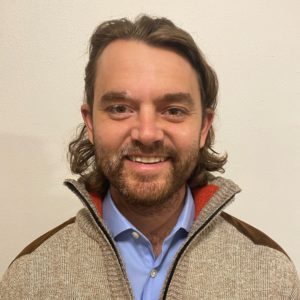To address contaminants of emerging concern that pose threats to Great Lakes ecosystems and public health in Wisconsin, Sea Grant created an emerging contaminants scientist position. After a nationwide search, Gavin Dehnert was hired, and he begins work on May 3.
Emerging contaminants include pharmaceuticals, personal care products, perfluoroalkyl and polyfluoroalkyl substances (PFAS) and pesticides. Although many of these compounds are detected at low levels in surface waters, they may have adverse impacts on aquatic ecosystems.
“Wisconsin Sea Grant has long funded researchers who strive to increase knowledge about contaminants affecting Great Lakes ecosystems,” said David Hart, Wisconsin Sea Grant assistant director for extension. “The National Sea Grant Office has identified contaminants of emerging concern in aquatic environments as needing increased investment. Gavin brings a wealth of experience that will help us build research partnerships addressing emerging contaminants and bridge research with outreach and education efforts.”

Gavin Dehnert. Submitted photo
If Dehnert’s name sounds familiar, it’s because he has a history with Wisconsin Sea Grant. Dehnert recently completed a Wisconsin Water Resources Science-Policy Postdoctoral Fellowship, where he worked with the Wisconsin Department of Health Services (DHS) to develop groundwater standards for 22 drinking water contaminants, including 16 forms of PFAS. He also helped create a hazard index risk assessment, which offers guidance when mixtures of PFAS are found in water.
Additionally, Dehnert gained outreach experience through his fellowship. The PFAS drinking water standards were released through the governor’s office last year. “That was an experience like none other,” Dehnert said. “Giving a press conference – I felt like a TV star. I would definitely not have done something like that if I hadn’t been in the fellowship.”
His emerging contaminants position will put all these skills to use through the lens of actionable science – sound science guided by strong relationships with stakeholders, coupled with effective outreach and communication. Dehnert met many of those stakeholders during his fellowship.
“That network is one of the best things the fellowship gave me,” he said. “I’m also excited to continue both research and outreach. There’s no point in doing the research if you’re not able to share it or help move forward with actionable science. I’m excited to learn more about the different emerging contaminants that are coming to light and use science to further inform how we make decisions.”
Dehnert has undergraduate degrees in marine science and biology from the University of Miami, and a Ph.D. in integrative biology with a focus on toxicology from the University of Wisconsin-Madison where he studied the effects of herbicide 2,4-D exposure on the development and behavior of fish at different life stages.
Connect with Dehnert via email at dehnert2@aqua.wisc.edu or (608) 263-5348.
The post Sea Grant hires new emerging contaminants staff scientist first appeared on Wisconsin Sea Grant.
News Releases – Wisconsin Sea Grant
News Releases – Wisconsin Sea Grant
https://www.seagrant.wisc.edu/news/sea-grant-hires-new-emerging-contaminants-staff-scientist/
